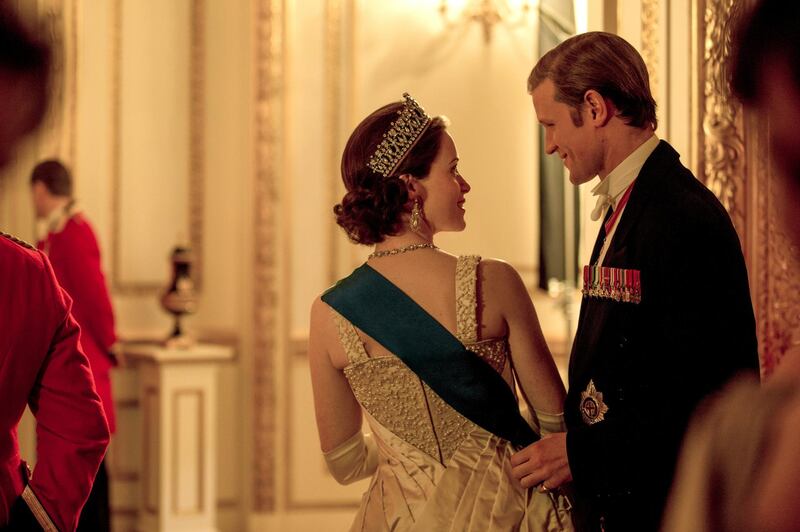The Crown, the popular series about the reign of British monarch Queen Elizabeth II, is the jewel of Netflix. The first season set in the aftermath of the Second World War introduced us to the recently married carefree princess who is put on the throne at a young age and her attempts to understand the job at hand. The upcoming second season starts in 1956 with the Suez Crisis and ends in the aftermath of the assassination of United States president John F Kennedy in 1964.
The principle cast of Claire Foy (Queen Elizabeth), Matt Smith (her husband Prince Philip) and Vanessa Kirby (Princess Margaret) are all on-set at Elstree Studios, just north of London, on the two days that I observe filming. The vast scope of the production is impressive as is the attention to detail of the sets.
Another remarkable feature is that several episodes of the series are being filmed concurrently. Three different episode directors, Stephen Daldry, Benjamin Caron and Philip Martin, are all at the studios filming. So while Smith and Foy are busy discussing the state of the nation in their boudoir, outside on the courtyard of the lot, Dexter star Michael C Hall, dressed up as president Kennedy, and Jodi Balfour as First Lady Jackie Kennedy are arriving at Buckingham Palace and waving to the (imaginary) crowds in a scene taking place several years later.
“We are shooting with different directors every day, this week I have shot with four different directors,” says Smith. The jumping of timelines also means costume changes and numerous visits to the make-up department. “This afternoon I will miraculously not be pregnant,” says Foy, who had been wearing a fake belly throughout the morning. “The make-up department have been extraordinary, as throughout the season we go through subtle little changes in how we look.”
There are also the personality changes of the characters to deal with. In this season we are going to see the Queen, who was rather schooled by Winston Churchill throughout the first season, come into her own as one of Britain’s most astute political minds.
_______________________
Read more:
[ Netflix to produce first Middle East content ]
[ Margaret Atwood’s Alias Grace is yet another must-see Netflix show ]
[ What we're loving: 11 TV shows to binge watch on Netflix ]
_______________________
“The Queen’s role is more defined,” says Foy. “She is more sure of her duty, which can be reassuring and can be boring. It’s definitely different with the prime minister, as she is no longer the pupil. With first Anthony Eden and then Harold Macmillan she doesn’t have a prime minister who lasts a full term and that puts pressure on her. It’s a very interesting dynamic.”
Yet while the Queen has decided that she now knows how to handle her exalted position and will do what is expected of her in the role, the same cannot be said of her closest allies, who are also her nemeses, her husband Prince Philip and sister Princess Margaret.
The season starts with Prince Philip opening the 1956 Olympics in Melbourne and, of course, the Queen and Margaret are at loggerheads over her choice of men and supposedly unbecoming ways.
“Philip is still not sure where he sits,” says Foy. “They are all struggling with their duty in a human way.”
“The relationship with Elizabeth is frayed and it was fun to do the showdowns,” says Kirby.
"We left Margaret at the end of the first season and she's not doing well, so in this season she meets Anthony Armstrong-Jones who is the antithesis of anyone she has ever met, he is the most unconventional person in terms of background and personality and interests, and he's really artistic and bohemian, and so he comes along and there's fireworks to say the least." We also see Margaret's failed engagement to Billy Wallace, son of Minister of Transport, Captain Euan Wallace.
Writer and show creator Peter Morgan also has fun delving into Prince Philip's past: "You learn a lot about Philip's history and that is really fascinating," says Smith.
How the Suez Crisis is handled is intriguing as the event is told through the perspective of British prime minister Eden, whose government collapsed.
“The pressure that we see on Eden is not just related to [Egyptian president Gamal Abdel] Nasser,” says show producer Michael Casey.
“Eden’s in a lot of pain himself and he’s the first prime minister after Churchill and he’s working under his shadow, and he realises that he doesn’t have the support he thought he had.
“What I found with the story is that there are so many parallels with the current UK relationship with that part of the world and it doesn’t feel like it’s evolved a lot since that time. But it’s a personal view from Eden rather than an in-depth view of the conflict and that time.”
The Crown is on Netflix, from December 8











